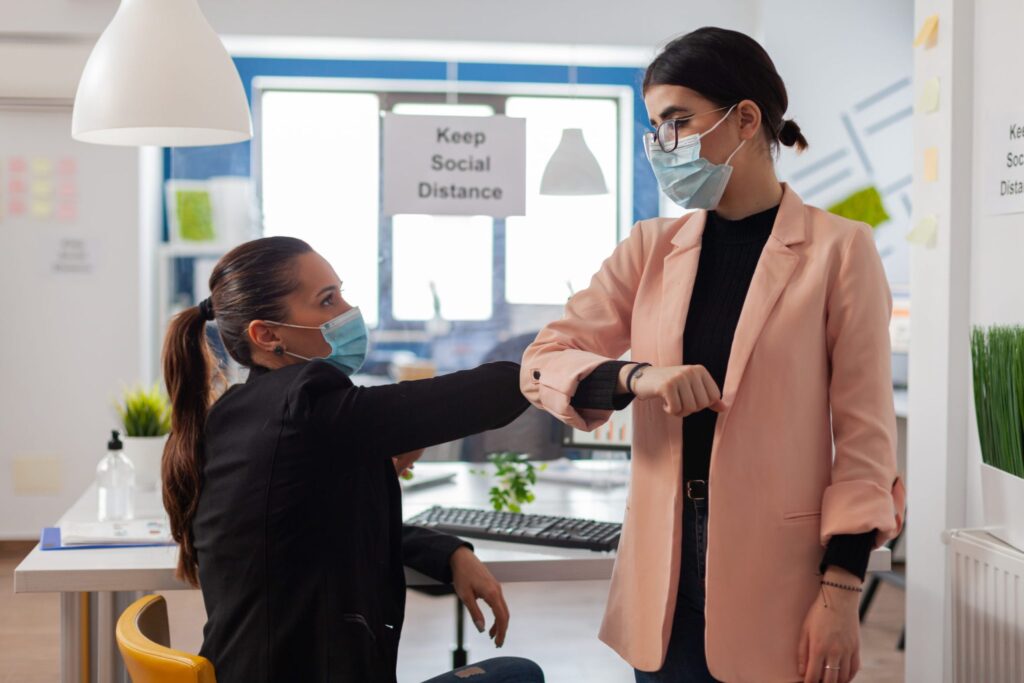When the Future of Work Exchange launched its flagship research study earlier this year, nearly 90% of business executives stated that they expected operations to return to “normal” within six months-to-a-year. The timing of our research data collection (Q1 2021) meant that by early 2022, the vast majority of enterprise leaders anticipated a better working environment that, in theory, would somewhat resemble pre-pandemic life. That key statistic reflected the hope and optimism brought by three major vaccines that were available to the general public at the tail end of winter. Phrases such as “Hot Vax Summer” were thrown around in anticipation of a return to summer glory after a 2020 that featured lockdowns, social distancing, and, presumably, many canceled vacations and trips.
There’s an interesting angle, though, when we break down that core research data: dig a little deeper into specific verticals and industries, and the picture changes tremendously. Ninety-eight percent (98%) of healthcare businesses believed that normality was, at the earliest, two years away. Retail? 75% stated two years. Distribution and logistics…nearly the same mindset (70% stating two years to normality). Nearly 65% of travel and hospitality concur, as do 62% of those in the education sector.
An article at Business Insider caught my attention for two reasons: 1) it perfectly encapsulated an overlooked reason for the so-called “Big Quit” or “Great Resignation,” and, 2) it struck so close to home, since my wife is a 20-year veteran of the veterinary industry and has been an essential worker since Day One. Human and veterinary medicine are two industries that consistently produce close encounters, crowded surgeries and exam rooms, and nearly no way to adhere to six-foot social distancing guidelines…which means one thing: vaccinations are ever-important in businesses that rely on close worker-to-worker contact to facilitate core operations.
Retail, distribution/logistics, travel, restaurants, education…all sectors that cannot leverage remote or hybrid work at the same scale as an industry like financial services or consulting. And thus, a new trend emerges: workers resigning or quitting due to health and safety concerns. Yes, there’s a talent revolution occurring today and that is something that cannot be overstated; however, in the greater scheme of talent and work, basic health and safety should never be a reason for a worker to voluntarily leave a position. The fact that this is a contributing factor to the ongoing series of resignations across the country means that any conversations around “normality” are shrouded in uncertainty.
Lagging vaccination rates, even in the wake of the Delta variant’s summer-to-fall rampage, mean that those workers that are vaccinated could be anxious regarding their own safety. After a typical shift (or one that careens into overtime hours, which is a reality when there’s a staffing shortage), any onset of sniffles, coughing, or subpar physical feelings can set off a wave of concerns regarding possible COVID exposure. Only 45% of businesses in the Future of Work Exchange Report for 2021 stated that the pandemic forced them to reevaluate their own processes for monitoring health and safety precautions, a far cry from the bigger pressures that businesses experienced over the past 18 months, including the reimagining of workforce management and the increased need for contingent and extended talent.
It’s no secret that many businesses have never taken the pandemic seriously. And it’s also not a surprise to hear that many business leaders have been prioritizing a return to the office for months, even though caseloads began to skyrocket during the summer months and, now, after a decline in October, are beginning to climb once again. Even the most vaccinated states in America (such as Massachusetts, where I live) have seen consistently-high coronavirus caseloads, which means that as more and more businesses push for normalcy, they will be putting their talent directly in harm’s way.
A common refrain regarding unvaccinated workers and those that don’t prioritize the pandemic’s wide-sweeping ramifications is often simple: COVID may not cause serious harm because of their age and vitality, so why mandate vaccines? Why take such rigid precautions? Well, the answer is clear-cut: COVID is caused by a novel virus that was discovered only two years ago. The threat of “long COVID” or passing along the illness to an immunodeficient relative/family member should always be top-of-mind. With the way the Delta variant changed the overall outlook for the pandemic, the government had no choice in instituting a nationwide vaccine mandate that would ensure that workplace environments are safe.
So much attention has been paid regarding the worker revolution happening within the business world, with more and more talented professionals are choosing different career paths, reevaluating their existing journeys, and/or holding out for better compensation. “Workplace standards” have always been a part of the conversation but not the center of this “talent revolution” discussion.
If a worker has no choice but to commute to a physical location and interact with other people, there should never be a question regarding workplace health and safety standards. Any worker that has to come home to children or immunocompromised individuals should not have the added stress of worrying about whether or not they’re bringing a vicious virus into their personal space. And, those workers that have pre-existing conditions that could cause a severe reaction to the coronavirus must be assured from their leaders that they either 1) have alternative work options (such as remote work), or, 2) are working in a facility that promotes social distancing, vaccinations, and actively enforce COVID restrictions within the workplace.
Government mandates will soon curb some of those poor conditions in non-remote, non-hybrid industries, especially as major retailers, medical facilities, warehouses, etc. push for mass vaccinations in the wake of the Biden administration’s new regulatory policies. However, that “return to normalcy” that every business aims for in 2022? Not going to happen if talented professionals continue to leave their positions over workplace safety concerns.

